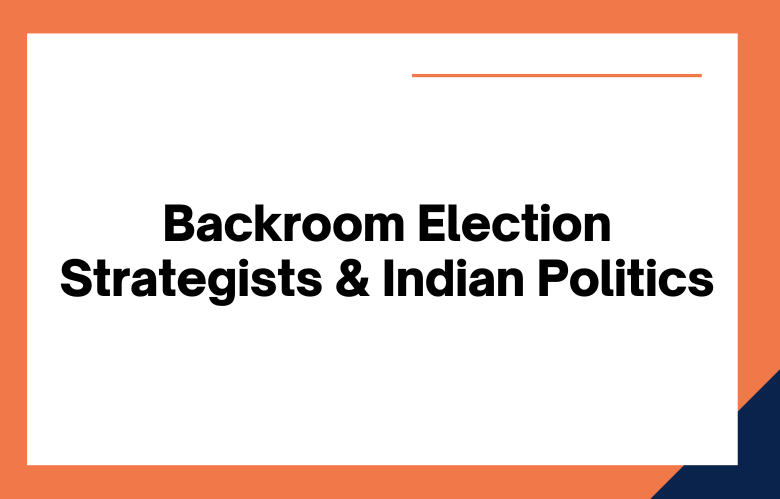It is no secret that Indian politics is a complex, intricate web of alliances, negotiations, and betrayals. It’s also no secret that the most influential people in Indian politics are not the Prime Minister or the President but the backroom election strategists. They pull the strings behind the scenes.
We’ll look at how these backroom strategists are changing Indian politics for the worse. We’ll also explore possible solutions to this problem.
Every political party in India has a team of strategists who work behind the scenes to ensure their party wins elections. These strategists are often relatively unknown, and the public little understands their work. However, they are essential to the functioning of Indian politics, and their role is increasingly important.
We will look into the role of backroom election strategists in Indian politics. We will explore their actions and how they help their party win elections.
We will also discuss the controversies surrounding these strategists and examine their impact on Indian democracy.
So, without further ado, let’s dive into the world of backroom election strategists!
What is Backroom Election Strategizing?
Backroom election strategizing is when political parties and candidates seeking election coordinate their activities to appear polished and prepared for the public eye.
Backroom election strategizing is a type of political campaigning done behind the scenes. It usually involves making deals and getting support from influential people to win an election.
Backroom election strategizing is a type of political strategy often used in India. It involves securing votes through various means, such as swaying recall elections and dealing with other politicians.
Backroom election strategizing is a process of planning and coordinating campaign activities in secret, away from public scrutiny.
How is Backroom Election Strategizing Changing Indian Politics?
Previously, backroom election strategizing was not as common in Indian politics. However, as competition has increased and the public has become more aware of the inner workings of the political process, more parties and candidates are engaging in this activity to gain an edge.
Backroom election strategizing is changing Indian politics because it is becoming more common. This type of campaigning allows candidates to get support from people who are not necessarily publicly supporting them, which can be a deciding factor in an election.
Backroom election strategizing is slowly changing the landscape of Indian politics. The practice has become widespread and is starting to significantly impact the outcome of elections. As backroom election strategizing becomes more prevalent, it will likely continue to change Indian politics meaningfully.
Backroom election strategizing is changing Indian politics by making it more secretive and less transparent. This campaigning makes it difficult for voters to make informed choices and hold politicians accountable.
The Benefits of Backroom Election Strategizing for Political Parties and Candidates
- Increased voter turnout
- More engaged and enthusiastic voters
- Better funded campaigns
- Less time spent on fundraising
- More time to focus on policy positions and platforms
- More accessible to target critical demographics
- More volunteers and donations from the public
- Better organization and communication within the party or campaign
- Reduced spending on election campaigns
- Improved relations with other political parties or organizations
- Enhanced communication between party leaders and the voting public
- Encourages more people to run for office
- It helps to identify potential swing districts and states
- Allows for last-minute changes to campaign strategy
- It enables parties and candidates better understand the electorate
- Allows for targeted voter outreach
- Facilitates get-out-the-vote efforts
- Encourages early voting
- Increases turnout on election day
- Boosts support for party and candidate platforms
- It provides a more accurate picture of the race as it unfolds
- Backroom election strategizing can give political parties and candidates a strategic advantage on the campaign trail
- It can help them better understand their opponents and how to defeat them
- It can help them raise more money from donors
- It can help them win over key voting blocs
- It can help them get out the vote on election day
- More accurate polling data
- Reduced spending on campaigns
- Better allocation of resources among competing political parties
- Increased grassroots activism
- More engaged and enthusiastic party members
- Better allocation of resources
- Stronger connection with voters
- Easier access to voting data
- Improved communication with the electorate
- More volunteers for the party or candidate
- Better allocation of resources
- Improved communication and messaging among different levels of the party or campaign
- More accurate polling and data gathering
- Easier identification of critical constituencies and target voters
- Greater insight into the voting process
- Backroom election strategizing can help political parties and candidates better understand their constituents.
- It can help them identify critical issues that are important to voters
- Strategizing can also help parties and candidates develop more effective campaign messages
- It allows them to target their resources more efficiently
- Finally, it helps them track the progress of their campaigns
How Social Media is being used to further the reach of Backroom Election Strategizers
Social media has permeated nearly every facet of our lives. However, we may not realize how it has shaped our society, even our elections. Backroom strategies once limited to a small, privileged group can now be executed on a much grander scale with social media tools at our fingertips.
Social media is a powerful tool to spread information quickly and easily. In the past, election strategies developed secretive behind closed doors. But now, social media can publicly share those strategies efficiently and speedily. It allows for more transparency and accountability in the political process.
Backroom election strategists are using social media to reach more people and gain support for their candidates. By posting on popular social media platforms, they can engage with potential voters and seem more approachable. Additionally, social media allows them to target specific demographics with certain marketing techniques.
The Challenges that come with using new Technology in the Political Sphere
- The potential for misuse of new Technology by politicians
- The challenge of regulating new Technology in the Political Sphere
- The need to educate politicians about how to use new technology responsibly
- The importance of protecting citizens’ privacy when using new technology
- The challenge of balancing the need for security with the need for transparency
- The need for transparency when it comes to new technology
- The importance of cybersecurity in the political Sphere
- The dangers of fake news and how to spot it
- How to use new technology responsibly
- The challenges that come with trying to keep up with new technology
- The temptation to use new technology for nefarious purposes
- The difficulties of adapting to new technology
- The dangers of relying too much on new technology
- The importance of staying informed about new Technology
- The need to be careful when using new technology
- The temptation to use new technology for nefarious purposes
- The difficulties of adapting to new technology
- The dangers of relying too much on new technology
- The importance of staying informed about new Technology
- The need to be careful when using new technology
- The challenge of getting people to adopt new technology
- The challenge of making sure that the Technology is secure and reliable
- The challenge of training people how to use the latest technology
- The challenge of dealing with unforeseen problems that may arise from using the latest technology
- The challenge of ensuring that the new Technology does not violate anyone’s privacy rights
- The need for faster communication in the political Sphere
- The dangers of hacking and cyber-attacks
- The importance of data security
- The challenge of getting everyone on board with new technology
- The need for transparency when using new technology
- The need for transparency when it comes to new technology
- The importance of cybersecurity in the political Sphere
- The challenges that come with using new Technology in the voting process
- The dangers of fake news and how to prevent it from spreading
- The need for regulation when it comes to new technology
- The potential for abuse of new Technology by those in power
- The challenge of regulating and monitoring further technology usage
- The need for transparency when using new Technology in the Political Sphere
- The importance of educating citizens about new Technology in the Political Sphere
- The danger of misinformation spreading through new technology channels
- The importance of maintaining freedom of speech when using new Technology in the Political Sphere
- The potential for new Technology to use for voter fraud
- The challenge of making sure that all citizens have access to new technology
- The difficulty of getting people to trust new technology
- The danger of cyber attacks on voting systems
- The importance of cross-checking data from different sources
- The need for transparency in the use of new technology
- The potential for hacking and cyber attacks
- The need for transparency and accountability
- The danger of data breaches
- The importance of user privacy
- The challenge of training staff to use new technology
- The risk of misinformation spreading online
- The need for increased security in the voting process
- The challenge of getting everyone on board with new technology
- The risk of hacking and cyber attacks
- The cost of implementing new technology
- The time it takes to implement new technology
How individual Voters are being affected by Backroom Election strategizing
Active voters are feeling the effects of backroom election strategizing. Some say they are left out of the process, while others think their voices are. As the election season ramps, individual voters must hear their voices above the din of special interests and party politics.
A new study shows that backroom election strategizing affects individual voters in various ways. Some voters feel more engaged with the process, while others think disengaged and distrustful.
The future of Backroom Election strategizing in India
In India, election strategizing is evolving.
Gone are the days when campaigns run from dusty backrooms. Teams of highly skilled professionals are now using cutting-edge data and Technology to win elections.
This new era of electioneering is exciting and full of potential. But it also comes with challenges as campaigns become more complex and the risk of foul play increases.
To ensure democracy thrives in India, all stakeholders must work together to promote fair elections. It includes ensuring that campaigns are run transparently and within the bounds of the law.
The future of backroom election strategizing in India will be exciting. Political parties must be more careful about who they leak information to and what kind of information they drip. In the past, backroom election strategizing has been an essential part of Indian politics. But with the increased social media and the 24-hour news cycle, controlling the message has become more challenging.
India has a thriving democracy, and every election is contested. The stakes are high, and the campaigns are long and grueling. In the heat of battle, all activities move to the front lines. But even as the movements wage on, backroom strategizing continues unabated.
It is where the future of Indian elections decides. The country’s best and brightest minds will pore over data, sift through campaign finance reports, and develop new ways to target voters. They will formulate get-out-the-vote strategies, message testing, and opposition research. And they will do it all, hoping to win just a few more votes.
In India, the future of backroom election strategizing looks promising. It is thanks to the recent changes in the country’s voting system. Now, instead of being based on caste and religion, voting is focused on issues and policies. This shift could help create a more equitable and representative democracy in India.
Backroom election strategizing in India has a long and storied history.
Today, the future of this process is in question.
Technology is upending traditional campaigning methods, and new players willing to challenge the status quo have emerged.
The future of backroom election strategizing in India is uncertain – but change is coming.
In India, the future of backroom election strategizing is shrouded in mystery. But some say the country’s political parties are turning to new, technologically savvy ways to win campaigns.
“There’s a big push toward using big data and analytics in Indian elections,” said one observer. ” Parties are looking to mine voter databases and social media to find new voters and understand what issues matter to them.”
As the world becomes more connected, other countries will likely follow suit and begin using data and Technology to win elections. For now, though, India is at the forefront of this trend.
The future of backroom election strategizing in India looks promising. Strategies are changing and becoming more sophisticated. Candidates are relying less on big donors and more on small donors. And most importantly, voters are beginning to pay attention to the details of the campaigns. All signs point to a more democratic future for India.
The future of backroom election strategizing in India is looking very good. Many factors contribute to this, but the most important is that the ruling party is very unpopular. It has created an enormous opportunity for opposition parties to come to power, using all their resources to ensure they win.
It has resulted in a lot of money being poured into backroom election strategizing, which is paying off. The opposition parties are gaining ground and expect significant gains in the next election. It is terrible news for the ruling party but good news for the people of India who want to see change.
In India, the future of election strategizing is in the backroom. Candidates and parties increasingly turn to professional strategists to help them plan and execute their campaigns.
This shift is driven by several factors, including the tribal nature of Indian politics, the need to get up in a crowded field, and the rise of social media.
Backroom strategists are becoming increasingly important players in Indian politics, and their role will likely grow.
In India, the future of election strategizing is in the backroom. Political operatives work behind the scenes to plot campaigns and guarantee victory for their party.
But what do you mean about the future of Democracy in India? Some say that backroom dealing puts too much power in the hands of a few individuals. Others believe that it’s simply a part of the political process.
What this case, one thing is clear: the future of backroom election strategizing in India will significantly impact the country’s political landscape.
Conclusion
The field of political strategy is constantly evolving, and as we have seen in this election season, even the most well-established methods can be upended. If you are looking to stay ahead of the curve in Indian politics or want help executing a winning campaign strategy, contact us today.
Our team, with its experience, helps candidates at all levels win elections and build successful political careers.
We are honored to put our expertise to work for you.
One way to get in touch is by filling out our online form on this site or give us a call at
+91 9848321284. Let’s work together today!











